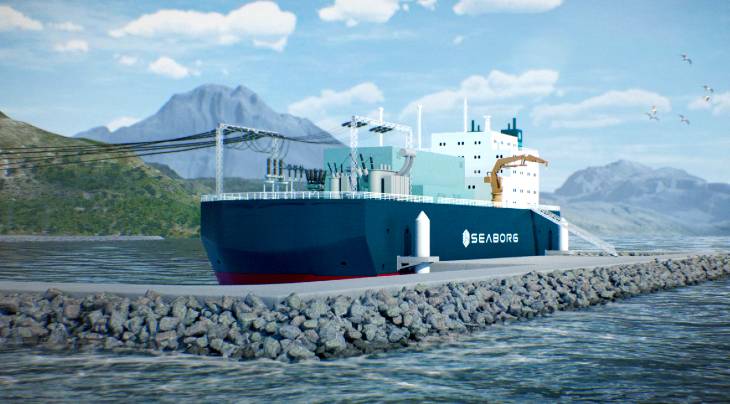Indonesian power company Pertamina NRE has signed a memorandum of understanding with Denmark's Seaborg to investigate the deployment of Seaborg's compact molten salt reactor (CMSR) Power Barge in Indonesia.

How one of its floating power barges could look (Image: Seaborg)
Pertamina NRE - a subsidiary of PT Pertamina (Persero), Indonesia's largest energy company - and Seaborg will use the assessment to scope an initial project where the commercial deployment of the CMSR Power Barge is feasible and commercially viable.
Followed by the initial project results, potential follow-up projects will be considered. The utilisation of the energy could be to supply power to the grid, directly to industry or for the production of alternative fuels, such as hydrogen, ammonia and methanol.
Based on the results of the studies, further collaboration such as the development and deployment of a CMSR Power Barge with a capacity of between 200 MWe and 800 MWe will be considered.
"Although the economics have yet to be finalised, an estimated investment of USD1–3 billion would be required, which would lead to significant contributions of CO2 reduction towards the Government of Indonesia's net-zero ambitions as well as other potential economic multipliers," Seaborg said.
It added that once the project has matured to the investment-ready stage, both parties intend to attract foreign direct investments to realise the project.
Seaborg's design is for modular CMSR power barges equipped with between two and eight 100 MWe CMSRs, with an operational life of 24 years. Instead of having solid fuel rods that need constant cooling, the CMSR's fuel is mixed in a liquid salt that acts as a coolant, which means that it will simply shut down and solidify in case of emergency. However, the low-enriched fluoride fuel salt is not yet commercially available, so Seaborg recently announced the initial power barges will be fuelled with low-enriched uranium (LEU).
In July, Seaborg signed a letter of intent with Norsk Kjernekraft to investigate the deployment of Seaborg's CMSR in Norway. The Norwegian company aims to build, own and operate small modular nuclear power plants in Norway in collaboration with power-intensive industry.
The previous month, Seaborg signed a memorandum of understanding with Kepco Nuclear Fuel and GS Engineering & Construction to collaborate on investigating the feasibility of developing an LEU fuel salt production facility in South Korea.
In April 2022, Samsung Heavy Industries (SHI) and Seaborg signed a memorandum of understanding to manufacture and sell turnkey power plants combining SHI's ship-building expertise and Seaborg's CMSR. It also covered the development of hydrogen production plants and ammonia plants.
Researched and written by World Nuclear News